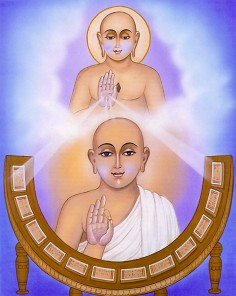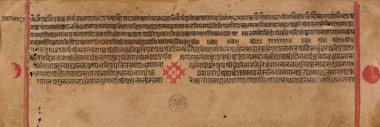Seventh Lecture: The Parable of the Ram, etc.
As somebody, to provide for (the arrival of) a guest, brings up a young ram, gives it rice and gram,[1] and brings it up in his yard; (1)
Then when it is grown up and big, fat and of a large belly, fattened and of a plump body, it is ready for the guest. (2)
As long as no guest comes, the poor (animal) lives; but as soon as a guest arrives, its head is cut off, and it is eaten. (3)
As this ram is well treated for the sake of a guest, even so an ignorant, great sinner longs (as it were) for life in hell. (4)
An ignorant man kills, tells lies, robs on the highway, steals foreign goods, deceives, (always thinking of some one) whom he could plunder, the villain. (5)
He is desirous of women and pleasures, he enters on undertakings and business, drinks liquor, eats meat, becomes strong, a subduer of foes. (6)
He eats crisp goats’ meat, his belly grows, and his veins swell with blood—but he gains nothing but life in hell, just as the ram is only fed to be killed for the sake of a guest. (7)
After having enjoyed pleasant seats, beds, carriages, riches, and pleasures, after having squandered his wealth which he had so much trouble in gaining, and after having committed many sins, he will, under the burden of his Karman, and believing only in the visible world, be grieved in the hour of death like the ram[2] at the arrival of a guest. (8, 9)
Then the sinner who has been killing living beings, at the end of his life falls from his state,[3] and against his will he goes to the world of the Asuras, to the dark place. (10)
As a man for the sake of one Kākinī[4] (risks and) loses a thousand (Kārṣāpaṇas), or as the king lost his kingdom (and life) by eating a mango-fruit which he was strictly forbidden (by his physician):[5] (11)
Even so are human pleasures compared with the pleasures of the gods: divine life and pleasures surpass (the former) a thousand times and more. (12)
Those endowed with excellent knowledge live many nayutas[6] of years; so great a loss suffer the fools in a life of less than a hundred years! (13)
Three merchants set out on their travels, each with his capital; one of them gained there much, the second returned with his capital, and the third merchant came home after having lost his capital. This parable[7] is taken from common life; learn (to apply it) to the Law. (14, 15)
The capital is human life, the gain is heaven; through the loss of that capital man must be born as a denizen of hell or a brute animal. (16)
These are the two courses open to the sinner; they consist in misery, as corporal punishment, etc.; for the slave to his lusts[8] has forfeited human life and divine life. (17)
Having once forfeited them, he will have to endure these two states of misery; it will be difficult for him to attain an upward course[9]for a long time to come. (18)
Considering what is at stake, one should weigh (the chances of) the sinner and of the virtuous man (in one’s mind).
He who brings back his capital, is (to be compared to) one who is born again as a man. (19)
Those men who through the exercise of various virtues[10] become pious householders, will be born again as men; for all beings will reap the fruit of their actions. (20)
But he who increases his capital, is (to be compared to) one who practises eminent virtues; the virtuous, excellent man cheerfully attains the state of gods.[11] (21)
When one thus knows that a (virtuous) monk or householder will be gladdened (by his gain), how, then, should a man, whilst he is losing (his chance), not be conscious of his losing it? (22)
As a drop of water at the top of a blade of Kuśa-grass dwindles down to naught when compared with the ocean, so do human pleasures when compared with divine pleasures. (23)
The pleasures in this very limited life of men are like (the water at) the top of a blade of Kuśa-grass; for the sake of what will a man not care to gain and to keep (so precious a good which he risks to lose)? (24)
He who has not renounced pleasure, will miss his aim (i.e. the true end of his soul); for though he has been taught the right way, he will go astray again and again. (25)
But he who has renounced pleasure, will not miss his aim; (he will think): I have learned that, by getting rid of this vile body, I shall become a god. (26)
He will be born among men where there is wealth, beauty, glory, fame, long life, and eminent happiness. (27)
See the folly of the sinner who practises unrighteousness: turning away from the Law, the great sinner will be born in hell. (28)
See the wisdom of the wise man who follows the true Law: turning away from unrighteousness, the virtuous man will be born as a god. (29)
A wise man weighs in his mind the state of the sinner and that of the virtuous man; quitting the state of the sinner, a sage realises that of the virtuous. (30)
Thus I say.
49,786,136,000,000,000,000,000,000,000,000.
It is derived in the following way:
1 pūrvāṅga = 8,400,000
1 pūrva = 8,400,000 pūrvāṅgas.
1 nayutānga = 8,400,000 pūrvas.
1 nayuta = 8,400,000 nayutāṅgas.
 Ganadhar Sudharma Swami
Ganadhar Sudharma Swami
